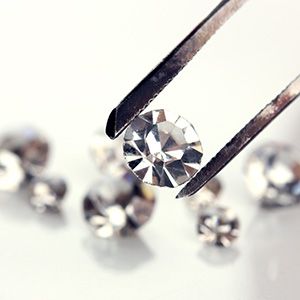
The Advertising Standards Authority (ASA), the United Kingdom’s industry-governed ad watchdog, recently found that e-tailer Ethica Diamonds did not use proper descriptors on its site for its lab-grown diamonds, nor did it adequately differentiate its lab-grown diamonds from non-diamond simulants.
The ASA’s ruling stemmed from a complaint from Diotima & Co., a rival site to Ethica, which—in a strange, sad twist—is run by Jason Foreman, ex-husband of Ethica founder and owner Elaine Reffell.
Despite its unfortunate personal aspect, the case serves as a reminder of the rules governing lab-grown diamond and diamond simulant disclosure in the United Kingdom—which are almost identical to those in the United States.
Diotima complained to the ASA that Ethica regularly described non-diamond simulants—which look like diamonds but aren’t—as “diamonds.”
Ethica acknowledged that it sells two kinds of stones: lab-grown diamonds from Diamond Foundry—which have the same chemical composition as mined diamonds but are produced in a lab—and diamond simulants—which usually means cubic zirconia but in this case meant synthetic moissanite with a diamond coating. Both types of stone were sold under the banner “Ethica Diamonds.”
The ASA acknowledged Ethica’s site had pages that explained the difference, and that it headlined its pages with the phrase “Kind, not mined.” But the ASA, consulting the National Association of Jewellers’ Diamond Terminology Guideline, concluded that wasn’t enough.
For instance, the site’s description of its moissanite product said: “The Ethica Diamond is grown in a laboratory utilizing advanced diamond technology, which creates a unique gemstone optically identical to diamond and of the highest quality, color, and clarity.”
The ASA called that description inadequate and said it was “misleading” to label that product or any simulant—a category of stone that looks like a diamond but has a different chemical composition—as a “diamond,” given it isn’t actually a diamond.
“Ads for diamond alternatives [should provide] clear qualification as to the nature of the product in order to avoid misleading consumers,” the ruling said.
When selling diamond look-alikes, the ruling continued, sellers should only use the word diamond “directly alongside the qualifiers ‘imitation’ or ‘simulant.’”
The ruling further declared that the term diamond alternative—which is widely used among U.S. sellers of cubic zirconia and other simulants—did not make the product’s nature “sufficiently clear.” The group called the phrase alternative to diamond “acceptable so long as it was used in close conjunction with” either simulant or imitation.
The ASA also found that some of the terms Ethica used to describe its actual lab-created diamonds—such as carbon-neutral diamonds and ethical diamonds—did not sufficiently disclose the stone’s laboratory origin.
Consumers “understand the word diamond to mean a mineral consisting of crystallized carbon that was entirely created by nature,” said the ruling.
It said that the site needed to include appropriate identifiers, such as laboratory-grown diamond or synthetic.
The ASA wrote that phrases like “kind, not mined” and “Ethica Diamonds” could help some consumers but were “sufficiently ambiguous that many consumers would still expect that products sold under the name Ethica Diamonds were natural diamonds without further clarification.”
Summing up, the ruling said the site must “describe products that did not have the same chemical composition as diamond as ‘diamond’ in isolation” and always label man-made diamonds with the modifiers laboratory-grown or synthetic.
That generally echoes the long-standing guidance from the Federal Trade Commission (FTC), with one exception: In 2018, the FTC removed synthetic from its list of recommended lab-grown descriptors (although, contrary to some assertions, it did not prohibit its use). Under the FTC Guides, laboratory-grown is an acceptable descriptor for man-made diamonds, and so is laboratory-created and [company]-created.
Refreshers on FTC guidance for lab-grown diamonds and diamond simulants can be found on the agency’s site, as well as here and here.
Ethica tells JCK: “Our company strapline, which appears at the top of our website and on every page, is ‘Kind, not mined,’ and throughout our website we talk about the merits of lab-grown diamonds. We never intended to mislead anyone… We [have] yet to receive any feedback from customers who feel our marketing has ever been misleading.”
Owner Elaine Reffell says that while Ethica, which is co-owned by her daughter Emily, changed its advertising to comply with the ASA’s wishes, the complaint was brought in “bad faith” by her “ex-husband of 24 years and his new wife,” with whom she’s currently enmeshed in a trademark dispute over the name “Ethica.” (UPDATE: Reffell has since prevailed in the trademark dispute.)
She says that, when first approached by the ASA, the site made the requested changes, and ASA closed the case. But Diotima continued to complain.
“[It pointed] to content that had been cached by Google, as it takes a while for Google to change the SEO on webpages,” she adds. “The ASA explained to us that they had no choice but to reopen the case.”
An email to Diotima’s online contact was returned with the message that the mailbox was unavailable. But Jewellery Focus quoted director Avila Foreman as saying the decision was a “significant step forward for the diamond industry in ensuring there is clarity for consumers with regards to authentic, natural diamonds versus the synthetic diamond alternatives that we are seeing come to market.”
In 2019, the FTC sent eight companies warning letters, cautioning them about potentially misleading advertising for lab-grown diamonds and simulants. Earlier this year, the National Advertising Division, a U.S. industry watchdog comparable to the ASA, advised that Diamond Foundry and its subsidiary Vrai modify their diamond disclosure practices.
(Image credit: Getty)
- Subscribe to the JCK News Daily
- Subscribe to the JCK Special Report
- Follow JCK on Instagram: @jckmagazine
- Follow JCK on X: @jckmagazine
- Follow JCK on Facebook: @jckmagazine






